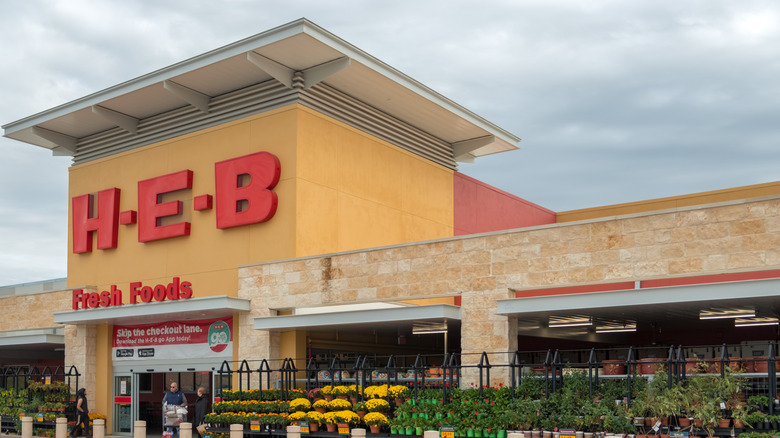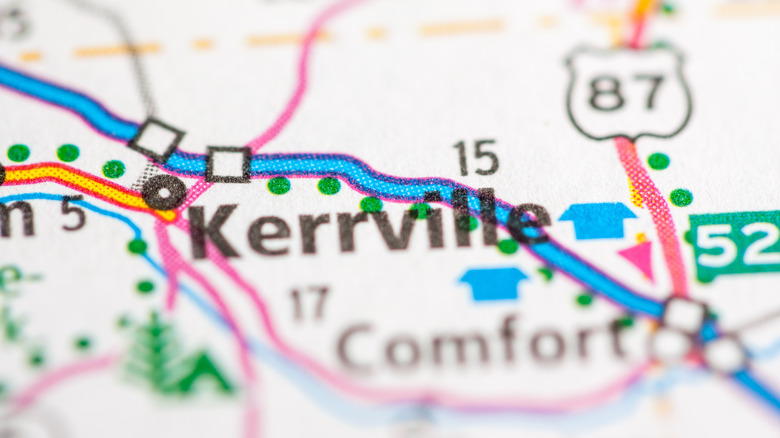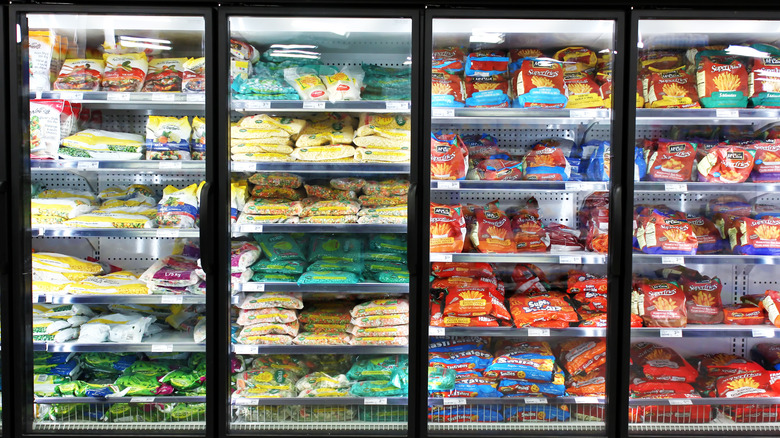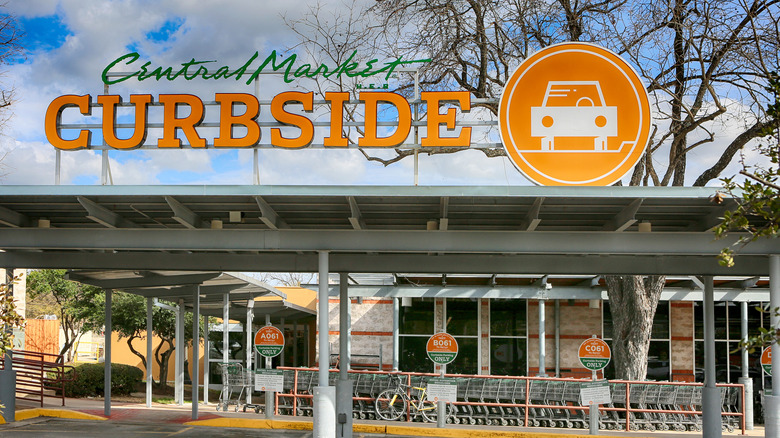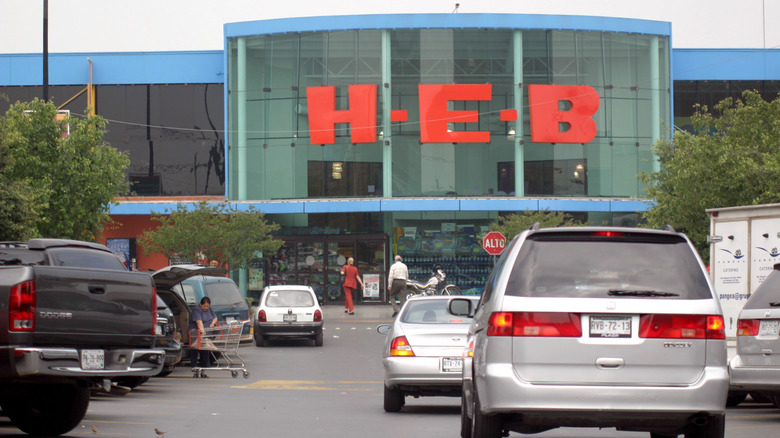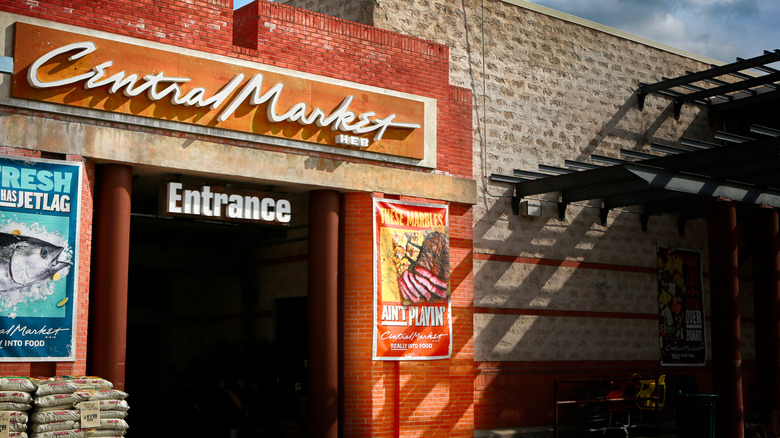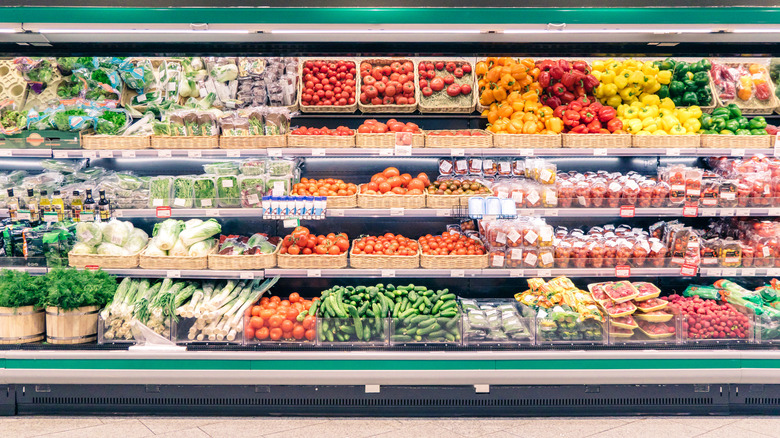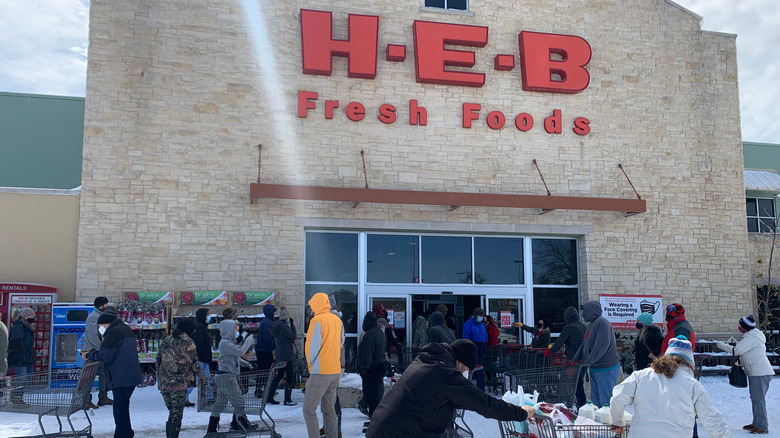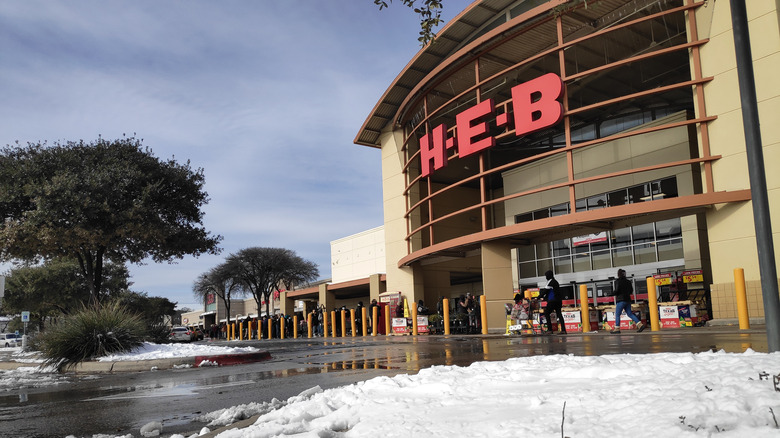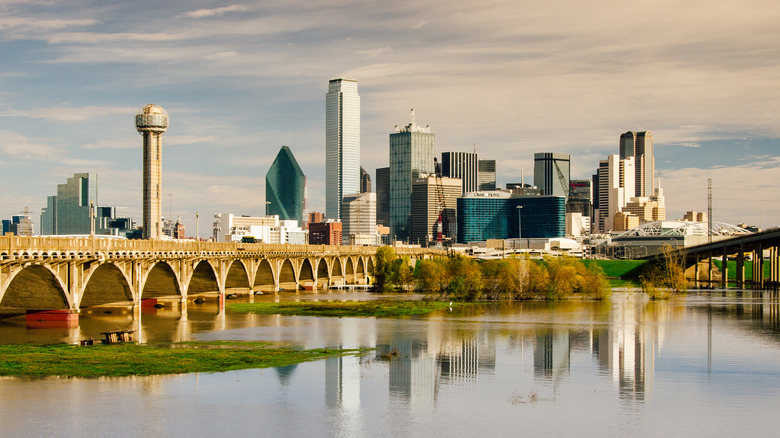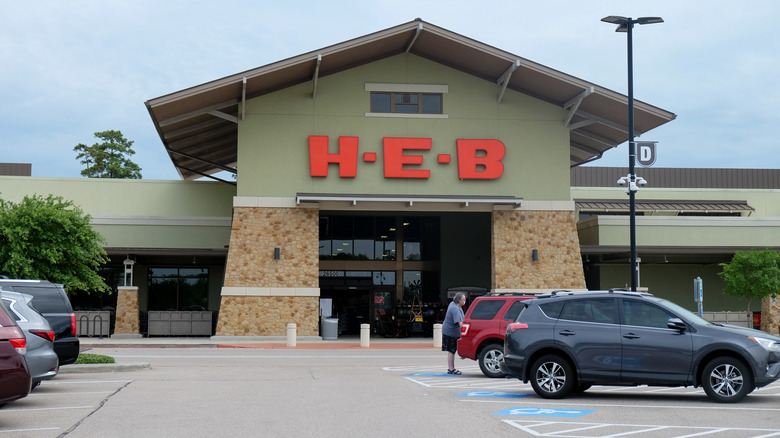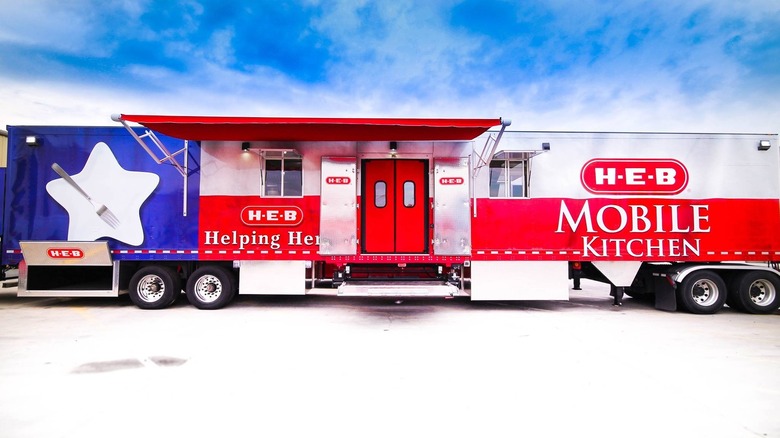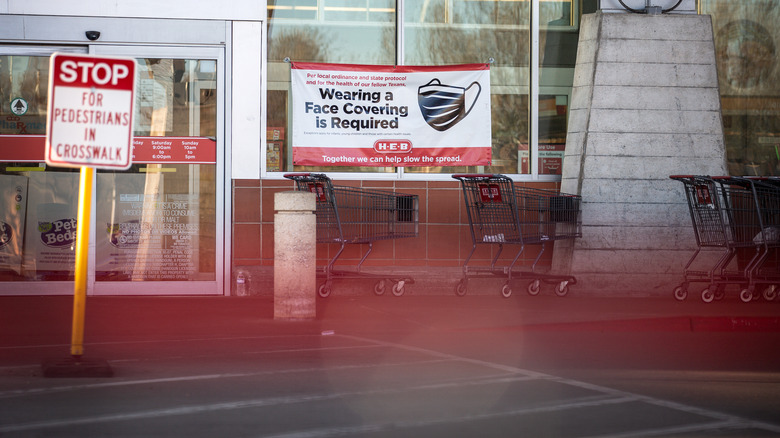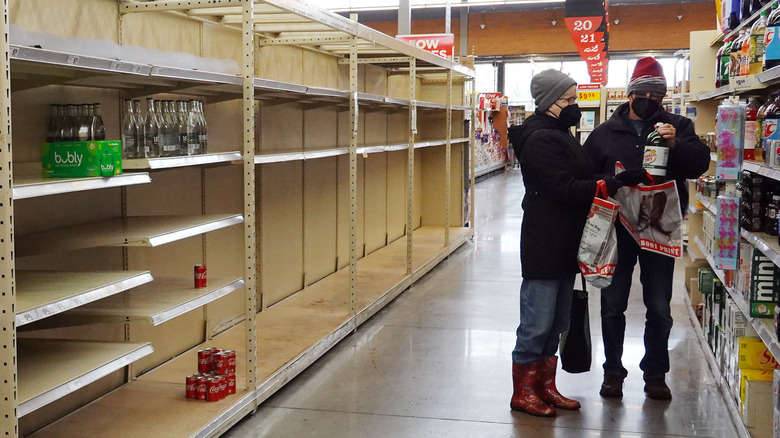The Untold Truth Of H-E-B Supermarket
No matter where you live, there is probably a grocery store there that people tend to flock towards more than others. In the Northeast, that might be Wegmans. In California, it's Trader Joe's. And in Texas, that store is H-E-B. H-E-B might be "just a grocery store" if you've never been in one, but once you've shopped at the grocery chain, then you know it's so much more than an ordinary store. Honestly, it's an experience, and there's a reason why Texans are so obsessed with it — and it's not just because of the great prices and large selection of items.
H-E-B is beloved by everyone who shops there, but there's more to the store than meets the eye. Yes, even if you're the grocery chain's biggest fan, there are probably a lot of facts and surprising pieces of information you didn't know about H-E-B. So, what's the untold truth of H-E-B? Well, it's pretty interesting, and you'll definitely want to keep reading to learn more.
It all started in a small Texas town
Obviously, H-E-B is a grocery store mostly exclusive to Texas (we'll get to their other locations in a bit). Because of how large, widespread and successful H-E-B is today, you might not expect the store to have such humble beginnings. But it does, and what's more, H-E-B was actually first started by a woman.
Yes, according to H-E-B's own website, it was in 1905 that Florence Butt opened the C.C. Butt Grocery Store in Kerrville, Texas, which had fewer than 2,000 people at the time. Butt only invested $60 into the grocery store to get it off the ground. Then, in the 1920s, Butt's youngest son Howard E. Butt took over the family business and expanded it with two new stores in a relatively short amount of time. As you can see, the H-E-B initials you know and love today came from the son of the original grocery store owner.
H-E-B didn't always have a frozen section
Believe it or not, there was actually once a time when air conditioning wasn't widely available. Yes, homes, office buildings, businesses, and stores all had to get by without any cooling system in them. This might not seem like a big deal in most cases, but when you think about a grocery store in Texas without air conditioning, you can see how keeping food fresh would be challenging.
Fortunately, in the 1940s, H-E-B was able to open its first stores with air conditioning, and because of that, they were able to stock frozen foods (via H-E-B). The brand was able to open more stores throughout Texas during the '40s and '50s and start shelving exclusive brand names. H-E-B started building modern supermarkets in the 1950s, following the now-familiar model of combining groceries, meat, a bakery, and a pharmacy in one store. It's hard to imagine there were ever grocery stores without frozen foods, but clearly, the times have changed.
In 1994 they reimagined the grocery store
As time went on, H-E-B expanded and opened more and more stores all across the great state of Texas, selling plenty of grocery items as well as household items like paper towels, cleaning supplies, and more. But it was in 1994 that H-E-B really decided to take things to the next level when they created Central Market (via Austin American-Stateman). At the time, the store was somewhat revolutionary as a kind of gourmet grocery store that only sold gourmet, one-of-a-kind products: no household items, no cans of Coke.
Basically, the goal of Central Market was to create an elevated grocery experience, one that stood out from all the other stores out there. Nancy Fernandez, who continues to work as a back-of-house cook in the cafe, told the Austin-American Statesman that it was truly a once-in-a-lifetime chance just to work at Central Market. "It was exciting to put your hands on the best food in the world," Fernandez said. "Not every chef or cook gets that opportunity." So, if you ever get the chance to go to Central Market, don't pass it up.
H-E-B has stores in Mexico, too
Obviously, H‑E‑B is beloved across the state of Texas and is thought to be the best grocery store around (via Eater). And sort of like Whataburger, part of what makes H‑E‑B so popular is that it, too, is mostly confined to Texas, at least as far as the United States goes. H‑E‑B also has stores across the border in Mexico.
It was in 1997 that H‑E‑B expanded to Mexico with its first Mexico store in Monterrey. And as of 2021, there were already more than 60 stores in the country, according to Produce Blue Book. Clearly, H‑E‑B found plenty of success in Mexico. It's pretty interesting that the only two places you can shop at an H‑E‑B are in Texas or Mexico. Basically, if you want to see what all the hype is about over this grocery store, then you need to head down South because it doesn't seem likely that they'll expand any time soon. As Eater explains, H-E-B is proud of its Texan roots and stays defiantly local.
H-E-B's Central Market was once a popular tourist stop
It truly seems like everything that H‑E‑B touches turns to gold. From their own brand-name products to their many store locations across Texas and Mexico, H‑E‑B just knows what it's doing. Case in point: Their Central Market store concept in Austin, Texas, was a famous destination for travelers to the city. The Austin-American Statesman says that when it opened, the store became one of Austin's most popular tourist attractions. And it definitely was a sight to behold. The original Central Market in Austin was 84,00 square feet, and its opening week was pretty monumental.
H‑E‑B originally thought about 40,000 people would show up that first week, but were shocked when over 98,000 people came to shop. "Customers ate up the concept," Liz Taylor-Culpon, a Central Market employee, told the Statesman. Clearly, Central Market is more than just a grocery store, and just like its parent store, H‑E‑B, it has somewhat of a cult following among its shoppers.
H-E-B's Central Market prides itself on being different
So, what is it exactly that makes H‑E‑B's Central Market so different and stand out from other grocery stores? Part of what sets it apart is that Central Market stocks up a lot of produce and food items that you would have a hard time finding anywhere else.
Specifally, they have a ton of produce items that seem to be out of a science fiction novel. "We'd get these artichokes that were this big," perishables director Mark Henson told the Austin-American Statesman, gesturing to convey the artichokes were seriously huge. "We called them baby's head artichokes. Peppers, too." People love being able to find unique produce as well as quality food items at Central Market. As Eater notes, it's also a good destination for international foods like whole spices, Indian lentils, miso, and more. For adventurous eaters who love to cook, the store is like a playground.
H-E-B is wildly successful for a regional grocery store
When you think of some of the most successful grocery stores in the United States, you probably think of Walmart, Kroger, or other stores that are nationwide. But despite the fact that H‑E‑B is only in Texas (well, and Mexico), it's actually very successful. And while that makes sense when you think about how much Texans adore their H‑E‑Bs, when you see just how successful the brand is, you'll probably be more than a little shocked.
In fact, H‑E‑B is so successful that Forbes actually ranked them the fifth-largest private company in America in 2021, which is a pretty big deal, especially when you consider the fact that H‑E‑B only operates in one state in the entire United States. What's more, H‑E‑B's revenue is seriously impressive, too, at $32.8 billion. Additionally, Forbes reported that H‑E‑B has 100,000 employees. Seriously, for a regional grocery store, H‑E‑B definitely does well for itself.
H-E-B had a major change-up in 2021
If you live in Texas, chances are you've seen at least one H-E-B commercial on television. Often, those commercials star a familiar face for Texans, the smiling and charismatic Scott McClelland. However, McClelland announced he was stepping down from his role as president and spokesperson for H-E-B in late 2021.
According to Culture Map Houston, McClelland won't officially retire until the end of the year in 2022, and he'll spend his final year advising the company while they expand into the Dallas-Fort Worth market. McClelland started to work for H-E-B in Houston in 2003 and helped the brand grow in that market. He ascended to president of the whole company in 2017. Obviously, this is a big change for H-E-B, but it's clear that McClelland really made a difference for the grocery store, and his presence will likely be missed by colleagues as well as shoppers who look forward to seeing his face on television every so often.
There's one major city in Texas that H-E-B was slow to conquer
Believe it or not, but the grocery store market in Texas is actually pretty competitive, and as popular and beloved as H-E-B is, it had a hard time taking over the Dallas-Fort Worth area. While Central Market has been in the area for over two decades, H-E-B has been slower to arrive in DFW. However, H-E-B is finally expanding in the area, and in March 2021, the company announced some major additions to its roster of store locations.
"This is an exciting day as we share plans to expand our presence in the DFW market with the introduction of H-E-B, our flagship banner, to our growing network of stores," said Stephen Butt, the president of the Central Market Division of H-E-B, in a press release announcing H-E-B's arrival to Plano and Frisco, which are Dallas suburbs. "For the past 20 years, Central Market has been committed to earning customers' trust, and H-E-B Partners will work hard to earn the confidence of the many new shoppers we look forward to serving in the Plano and Frisco communities." Watch out, Dallas, H-E-B is coming for you!
H-E-B values teachers
When it comes to honoring teachers, H-E-B does its best. Not only does H-E-B offer teachers in Texas special discounts on back-to-school shopping for the new school year ahead in August of each year, but the grocery store also honors educators in the public school system through their Excellence in Education Awards. These awards honor stand-out educational professionals. Each year, H-E-B selects a number of teachers, counselors, nurses, principals, and other school employees who have been nominated for going above and beyond for their students. H-E-B then rewards them with grants and cash awards for a job well done.
And in case you think these awards are small or don't make a difference, in 2020 H-E-B handed out over $430,000 in cash and grants to their Excellence in Education Award winners. That's a lot of money, and in wanting to help the Texas public schools so much, it's clear that H-E-B takes its loyalty towards its home state pretty seriously.
H-E-B and El Paso had beef
By now you know that Texans love H-E-B. In fact, you could ask almost any Texan what their favorite grocery store is, and there's about a 99% chance they'll say H-E-B (at least if they live in a part of the state that has H-E-Bs). However, in September 2020, this almost changed when H-E-B accidentally offended a large population of Texans, and started quite a controversy, however unintentionally. The El Paso Times reported that H-E-B came out with a new design for their house-brand soda, Original Cola. However, customers soon realized that the can cut off the Western tip of the state, which would have included El Paso, a city with notably zero H-E-B locations.
H-E-B spokesperson Dya Campos put out a statement assuring customers that H-E-B did not have any ill will towards El Paso. "The design on the can is adjusted to include the nutrition label ... and the design varies on the cans, bottles, and the 12-pack box and reflects the entire state in the total design package," Dya Campos said in an email. "H-E-B loves every inch of Texas!" she added. Still, it's pretty suspicious.
H-E-B is a first responder following natural disasters
In case customers needed another reason to love H-E-B, it has emerged as one of Texas' prominent first responders. After Hurricane Harvey wreaked havoc across the state in 2017, H-E-B sent a convoy of 15 vehicles into the community. These included mobile kitchens, water and fuel tankers, and trailers filled with food, ice, dry goods, and supplies. There were also H-E-B Disaster Response Units, with a pharmacy and business services center, where locals could fill prescriptions, cash checks, pay bills, and access an ATM. Additionally, 100 employees volunteered to assist in the operation.
According to Texas Monthly, H-E-B started preparing for its role in emergency response after Hurricane Rita hit Texas in 2005. The preparation paid off. Immediately after the successful response to Harvey, H-E-B (along with San Antonio Spurs legend, Tim Duncan) delivered 400,000 pounds of food to the Virgin Islands, which had been struck by Hurricane Irma. Then, in 2019, the chain sent its mobile kitchen to Dallas after the area was hit by a tornadoes. "We are in a year-round state of preparedness for different emergencies," H-E-B president Craig Boyan told the magazine.
H-E-B's dedication to its community was on display again in 2021 when Texas suffered a historic winter storm. The blizzard knocked out power throughout the state, including an Austin-area H-E-B. Unable to use the registers, the store allowed customers to have their groceries for free, knowing how crucial the supplies were during the emergency (via Austin360).
H-E-B handled the coronavirus pandemic extremely well
Obviously, the COVID-19 pandemic that began in 2020 really changed the way Americans shop for groceries. But H-E-B was on top of it and managed to navigate the pandemic extremely well, taking care of both customers and employees. According to Texas Monthly, H-E-B limited the number of certain popular products customers could buy, added on to its sick leave policy, enforced social distancing measures, cut back store hours, and even gave their employees a raise.
Justen Noakes, director of emergency preparedness at H-E-B, told Texas Monthly that the store handled the pandemic so well because they'd been preparing for something like it since 2005 when H5N1 started spreading. Still, Noakes added that it all came down to caring for the customers. "The most important lesson for us is to listen to what's going on in our stores," he explained. "When we started seeing the N95 masks and the sanitizers, we took that as a good sign that our customers were concerned about what was going on, and that's what really spurred us to activate our program." Clearly, H-E-B loves its customers just as much as they love it.
H-E-B dealt with a supply chain issue during the pandemic
It shouldn't really be shocking to learn that a lot of grocery stores have had some hiccups during the pandemic. Suppliers have also struggled to meet the demands for certain products like cleaning supplies, grocery items, and toilet paper. Because H-E-B generally handled the pandemic so well, it might actually be a bit of a surprise to learn that they too had supply issues, specifically related to disinfecting wipes, a particularly popular item during COVID-19.
In fact, H-E-B had such a problem with one of its manufacturers, Maverick International Ltd., that it filed a lawsuit against the company. According to H-E-B spokesman Valentino Lucio, the vendor "consistently failed to honor its commitments in a timely manner," and H-E-B had to go without the products that their customers so desperately needed, costing them a lot in sales (via Beaumont Enterprise). As smooth and smart as H-E-B has been over the course of the pandemic, and before the pandemic as well, there are just some things even the best grocery stores can't control.
